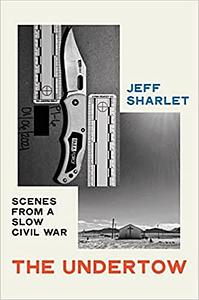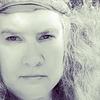Take a photo of a barcode or cover
informative
reflective
sad
medium-paced
Sharlet excels at painting a gritty image of a man travelling through the backroads and diners of America, interviewing families and communities who worship trump, Jesus, and their guns - in that order. Who preach patriotism while praising the insurrection and Sharlet explores it all as he traverses the states, like a jungle tour of the extreme American right and some of their talking points. Except - while some are extreme, their views are varied and their logic explored. This is no political article, this is a book on people, what they eat at night, how they care for their family - and also how they vote and what they believe, however extreme and wrong to me . Sharlet does an amazing job of exploring these people while eating at their dinner tables, sometimes facing danger, and often kindness too. The writing is extremely immersive, poetic and often beautiful too.
dark
informative
reflective
tense
medium-paced
Lost interest about 2/3 of the way through. The author is clearly good at writing and an observant journalist, but he beats the reader over the brow with his opinions on how white supremacy is the root of all our political problems. His commentary on how the Trump “movement” is semi-religious in its fervency and authoritarian in its Utopianism is well taken. But narrowing down the issue to simply a matter of racial prejudice and guilt, is simplistic and ignores the myriad social issues, blowback, countercurrents, and political history that made Trump the figure he is now.
I appreciate what this book was trying to do, and I wish I had liked it more, but it was not well proofread and it was so bleak and unpleasant that it was a really tough read.
challenging
dark
informative
inspiring
reflective
sad
medium-paced
I got tricked into thinking that this wouldn't be just a book about how Trump is fascist and the whole movement surrounding him is evil, I don't remember by what. What makes a good ethnography is a practiced indifference, a "moral relativism." What Sharlet displays, by contrast, is a practiced and elaborated hysteria. He's hard to take seriously; one feels the dread of ahistoricism, that the sense of outrage and fear are totally inapprorpiate to the subject and in consequence one's guide is totally untrustworthy. The people he follows and meets are idiotic and conspiratorial, sure, but isn't that rather normal for humans? It's the elevated and reflective disposition that's historically unusual, but in this book he doesn't embody that either. Maybe the rejoinder is that it was precisely the unusual democratic spirit that held America together and prevented civil war in the past (except when it didn't), but then, the argument would be in terms of what was missing, rather than this lofty and metaphysical tone that comes across as ridiculous in trying to make sinister something that is instead simple, vulgar, dismissable.
The vaunted Belafonte essay did nothing to me, except inflict a sadness at how compressed and oversimplified the dominant discussion about race in America has become as it's been politicized, because, for example, the life of Belafonte and his beliefs and attitudes are, I think, probably very interesting. Because it's true that not very long ago, racism was really was as vicious as people now pretend it still is, and thus had whole alternative social worlds associated with it, a real world of heroes and villains. But importing that into the present speaks to at least a lack of subtlety, and really to tremendous gall, or maybe credulousness. This one-note kind of racial intrigue-writing I can't stand, it's just tedious.
The incel essay was more interesting I guess but ultimately lacking in insight. The problem for this program, where the Internet New Right, Qanon, the manosphere, etc., are all grouped in with Trump reporting, or framed as its secret or inevitable source, is that half the country's voters chose Trump, and it simply defies reality to say that most of them have totally lost their mind. Maybe lots of them would profess crazy things, but you don't believe something just because you say you do (and anyway, the Internet/new generation of the left seems to profess just as many crazy things, crazy albeit in a more sophisticated way). How many of them really do crazy things, embody their beliefs in their actions? Surely some, sadly too many, more than before, many more than if Rubio had won the 2016 primary... but not enough to warrant being at the heart of this goofy reporter's account of the Trump phenomenon.
I wonder what will happen these next four years, I worry that I am too blase about it, and it's true that he has done damage to democratic norms--both directly, and by provoking the other side into overreaching. I don't fear Brownshirts in the streets or some bizarro fascist takeover, but maybe it really will be bad, or much worse than the first term, or enduringly so. I don't know. But these are things I acknowlege but don't believe in at all. Something in me just can't take it seriously anymore. Well, that's surely not helped by repeated histrionics, as in this book.
If I were to say more, it'd be about Trump as a great entertainer, as an embodiment of masculine values which are sorely lacking in the elite classes and even among politicians and which, taken to extremes, can truly be very bad, but seen as a corrective to an overall culture, I think are perfectly welcome, in fact overdue. That is, much of what is taken issue with might fit within those two categories, making them much more benign. I would also want to say that I think I have a rosier picture of the right than is possible to sustain, and which I will lose as more details come out about the upcoming Trump administration, I want to read some of the good "the Trump admin was a shambolic disgrace" books. I voted for Harris, anyway. I think he does have this (yes, appropriatedly described) fascist friends-and-enemies, zero-sum, patron-client attitude that is unmeritocratic and unacceptable. (More, it's offensive, somehow it's stupid.) Like provincial rather than urban people, what's the distinction I'm looking for? The conspiracy theory stuff is very bad, and again I think I have a biased portrait, where I focus on situations where the outsiders may have had a point (non-vaccine COVID questions, usually) whereas others might focus on ones more cut-and-dry, where the GOP is simply a know-nothing party, and I compare the chiding overreaches of the left against an unfairly idealized truth-seeking right. When really the chiding is ineffective but will eventually stop as an electoral failure, but its motivation was perfectly understandable in light of the crazy, bad, and (sometimes) genuinely dangerous ideas pedaled in the worst rightwing circles, on YouTube and Facebook and "TruthSocial" and whatever else. There's so much more to say, I hate that I can never express things right.
The vaunted Belafonte essay did nothing to me, except inflict a sadness at how compressed and oversimplified the dominant discussion about race in America has become as it's been politicized, because, for example, the life of Belafonte and his beliefs and attitudes are, I think, probably very interesting. Because it's true that not very long ago, racism was really was as vicious as people now pretend it still is, and thus had whole alternative social worlds associated with it, a real world of heroes and villains. But importing that into the present speaks to at least a lack of subtlety, and really to tremendous gall, or maybe credulousness. This one-note kind of racial intrigue-writing I can't stand, it's just tedious.
The incel essay was more interesting I guess but ultimately lacking in insight. The problem for this program, where the Internet New Right, Qanon, the manosphere, etc., are all grouped in with Trump reporting, or framed as its secret or inevitable source, is that half the country's voters chose Trump, and it simply defies reality to say that most of them have totally lost their mind. Maybe lots of them would profess crazy things, but you don't believe something just because you say you do (and anyway, the Internet/new generation of the left seems to profess just as many crazy things, crazy albeit in a more sophisticated way). How many of them really do crazy things, embody their beliefs in their actions? Surely some, sadly too many, more than before, many more than if Rubio had won the 2016 primary... but not enough to warrant being at the heart of this goofy reporter's account of the Trump phenomenon.
I wonder what will happen these next four years, I worry that I am too blase about it, and it's true that he has done damage to democratic norms--both directly, and by provoking the other side into overreaching. I don't fear Brownshirts in the streets or some bizarro fascist takeover, but maybe it really will be bad, or much worse than the first term, or enduringly so. I don't know. But these are things I acknowlege but don't believe in at all. Something in me just can't take it seriously anymore. Well, that's surely not helped by repeated histrionics, as in this book.
If I were to say more, it'd be about Trump as a great entertainer, as an embodiment of masculine values which are sorely lacking in the elite classes and even among politicians and which, taken to extremes, can truly be very bad, but seen as a corrective to an overall culture, I think are perfectly welcome, in fact overdue. That is, much of what is taken issue with might fit within those two categories, making them much more benign. I would also want to say that I think I have a rosier picture of the right than is possible to sustain, and which I will lose as more details come out about the upcoming Trump administration, I want to read some of the good "the Trump admin was a shambolic disgrace" books. I voted for Harris, anyway. I think he does have this (yes, appropriatedly described) fascist friends-and-enemies, zero-sum, patron-client attitude that is unmeritocratic and unacceptable. (More, it's offensive, somehow it's stupid.) Like provincial rather than urban people, what's the distinction I'm looking for? The conspiracy theory stuff is very bad, and again I think I have a biased portrait, where I focus on situations where the outsiders may have had a point (non-vaccine COVID questions, usually) whereas others might focus on ones more cut-and-dry, where the GOP is simply a know-nothing party, and I compare the chiding overreaches of the left against an unfairly idealized truth-seeking right. When really the chiding is ineffective but will eventually stop as an electoral failure, but its motivation was perfectly understandable in light of the crazy, bad, and (sometimes) genuinely dangerous ideas pedaled in the worst rightwing circles, on YouTube and Facebook and "TruthSocial" and whatever else. There's so much more to say, I hate that I can never express things right.
informative
reflective
tense
medium-paced
challenging
funny
informative
reflective
medium-paced
I have no idea what to make of this book and the people it portrays. It's like an anthropological exploration of antidemocratic extremists, Christian nationalists, and MAGA types as the author travels across the country. Some of the author's side commentary is esoteric, some just confusing to me. And it's unsettling to read these portrayals without being offered any solutions. Still, this was interesting and weird and I couldn't put it down.
adventurous
challenging
dark
informative
sad
tense
slow-paced




